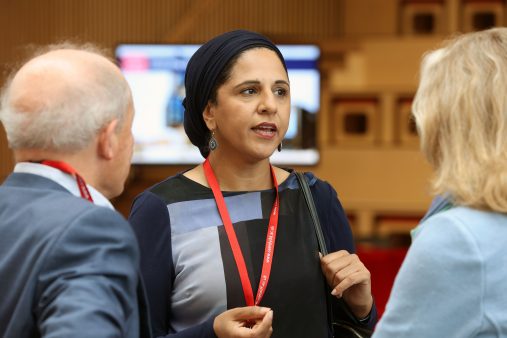Why people are key to societal change
18 July 2022
Special guests from the worlds of social science research-led innovation, politics, the third sector and government joined a recent celebration of sbarc|spark – Cardiff University’s new ‘superlab’ for co-creating solutions for society’s wicked problems.
In the third of a series of blogs* from the event’s four panellists, we hear from Fozia Irfan, Director of Children and Young People at BBC Children in Need.
Fozia discussed community-led change, collective impact and the role of academia and funders as contributors, highlighting the need to understand when to withdraw intervention and allow people to make the change they desire.

“If you know my background, you know that I am really interested in place-based community change. And so, I speak here, at this event, as a practitioner rather than an academic or a researcher.
The concept of sbarcIspark and what it intends to do in terms of bringing in different actors and different sectors into the same space is really exciting.
I have three aspects which I would urge people who work here to think about in terms of place-based innovation and community-led change.
The first is complexity and intersectionality. Researchers and philanthropists, and some funders, would like to deal with simplicity, but actually society and the way people are, is really messy and complex, and it’s very difficult to separate things from one another.
A quote which I love from Audre Lorde says, “There’s no such thing as a single-issue struggle because we do not live single-issue life.”Everything has to be interconnected. If you’re dealing with poverty, which we deal with at BBC Children in Need, it is inextricably linked to mental health, to housing, to education: all of these different opportunities.
I would urge people working in sbarcIspark to really embrace that complexity and work with multiple identity, multiple issue links.
My next point is about contribution, not attribution, an aspect I discuss a lot in funding circles, but I think it also applies to academia. As a funder or as an academic, I want to deal with one issue, put in place one intervention, and have one outcome.
I then want that outcome linked to the intervention, and the intervention to be linked to me as a researcher or as an organization so I can claim that that outcome proves my value. Somebody else may have conducted the research or intervention, there may be a thousand different reasons for that outcome, but I still want to attribute the outcome to myself to validate my presence as a funder or as a researcher.
Breaking these connections, is very important. Research actually shows that it’s been difficult to claim attribution for any single change or any single outcome in a person’s life or in society. There’s a whole complex, multiplicity of factors which lead to social change.
For me as a funder, understanding that the most helpful role that we can play is as contributors, taking place-based change to mean playing a part in collective impact rather than individual outcomes, is a really good place to start.
This brings me to my third point, which I hope is not controversial, though some people may find it controversial. Philanthropy doesn’t bring about social change. Academia and research don’t bring about social change. People bring about social change.
It may sound like blasphemy, but it is a very important distinction for us to understand. At BBC Children in Need, we are piloting a new fund called the Youth Social Action Fund, because we recognize young people know the solutions to their problems and actually, if we just facilitate and fund them, they will create the change that needs to happen.
If you think about the decades of research that everybody’s been doing, decades of philanthropy, decades of political lobbying, young people and communities have achieved more social change in the last five years than we have in the last 20 years. If you think of movements like #BlackLivesMatter, #metoo and climate change, they’ve been driven by people, by young people, by communities, quite often without funding or research institution or philanthropic backing. We need to see where the power and energy are, and let those communities lead the way.
My final piece of advice for all this place-based, work-based research is to know when you should step in, but more importantly, know when you need to step back and get out of the way.”
* Further blogs featuring Adam Price, Leader, Plaid Cymru and Kellie Beirne, Director of Cardiff Capital Region will follow in the weeks ahead.